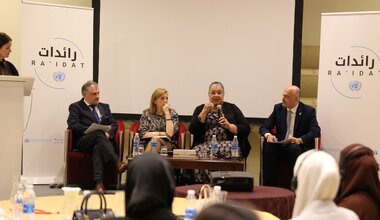UNSMIL organizes workshops on Security Sector Reform in Libya
TUNIS, 27 August 2024 – The United Nations Support Mission in Libya (UNSMIL) concluded two simultaneous workshops in Tunis aimed at strengthening the legislative authority’s role in reforming and developing Libya’s security sector.
The primary workshop brought together representatives from the Defense and National Security Committee of the House of Representatives, the National Security Committee of the High Council of State, security institutions, and military public prosecutors. The parallel workshop involved civil society organizations from across Libya.
In their final statement, representatives of the two committees of both chambers reaffirmed their commitment to a civil Libyan state, democratic elections, and rejecting foreign military presence. They also called for separating security and military functions, reviewing security sector laws in accordance with international human rights standards, and urging UNSMIL to facilitate dialogue between the House of Representatives and the High Council of State leading to a unified executive authority.
The participants emphasized their dedication to working together to implement the workshop’s recommendations and previous efforts to reform and develop the security sector. The goal is to create a safe and stable life for all Libyans while protecting their rights and freedoms through unified and legitimate institutions.
Badreddine El Harti, Director of the Security Institutions Services at UNSMIL, said the workshop is part of a series of events aligned with the Mission’s mandate and Security Council Resolution 2702/2023. The resolution recognizes the need to plan for security sector reform and the establishment of an inclusive, unified, accountable, civilian-led security architecture for Libya as a whole.
Representatives of civil society organizations participating in the parallel workshop discussed proposals for security sector reform under a unified government with nationwide control. They advocated for strengthening civil society’s role in developing national oversight mechanisms and accelerating the enactment of legislation regulating civil society operations in accordance with international human rights standards. Additionally, the participants recommended developing integrated strategic policies to enhance security and stability in various development, economic, social, and political aspects.
Al-Harti said, “The two-day workshops are affirmation of UNSMIL’s continued support for national efforts to develop the security sector and contribute to enhance long-term stability in Libya.”
 United Nations Peacekeeping
United Nations Peacekeeping UN
UN









